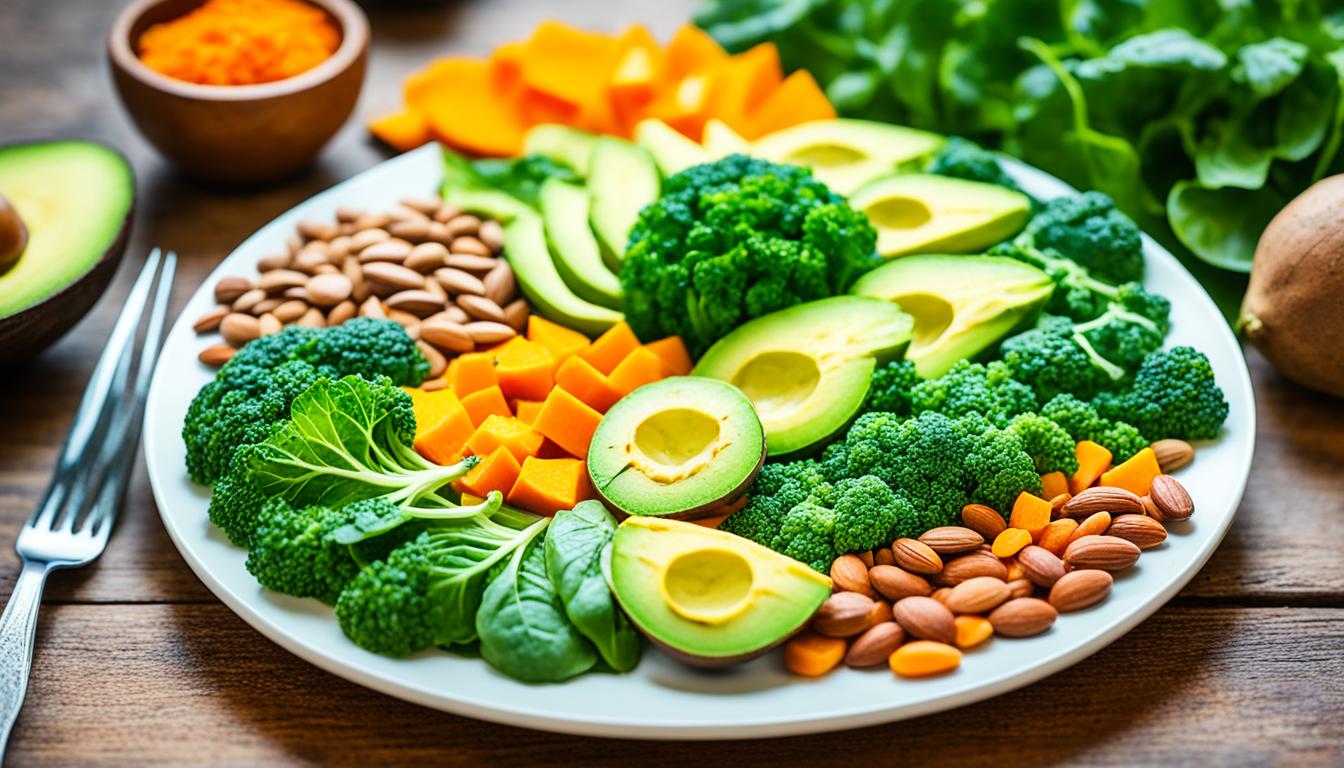Potassium is key in the body, the third most abundant mineral. It’s mostly found inside our cells. It helps with fluid balance, nerve signals, and muscle work. This is vital for our health. A diet rich in potassium brings many health perks. It lowers blood pressure and bloat, guards against stroke, and fights osteoporosis and kidney stones. Let’s dive into potassium’s health role.
Key Takeaways
- Potassium is an essential electrolyte that helps regulate fluid balance, nerve signals, and muscle contractions.
- A potassium-rich diet can help reduce blood pressure, protect against stroke, and prevent osteoporosis and kidney stones.
- Recommended potassium intake is 3,500-4,700 mg daily for adults. Key sources are fruits, vegetables, and whole grains.
- Doctor’s advice is needed for potassium supplements. Too much or too little potassium can harm.
- Keep track of your potassium if you take certain drugs or have some health issues.
What is Potassium?
Potassium is the third most abundant mineral in our bodies. It’s mostly inside our cells, 98% to be exact. As an electrolyte, it turns into positive ions. This lets it carry electricity which is vital for our body’s work.
Potassium as an Electrolyte
Eating enough potassium is crucial because it helps your body’s natural functions. It keeps our cells full of fluid, helps our nerves send messages, and lets our muscles move, including our heart.
Importance of Potassium in the Body
Potassium is super important in our bodies. It keeps fluids balanced, nerves working, and muscles moving, especially the heart. This little mineral does big things for our health.
Distribution of Potassium in the Body
Almost all of our potassium, 98%, is locked away inside our cells. The small 2% outside helps keep our bodily fluids and more in check. This balance is key for our health.
Role of Potassium in Fluid Balance
Potassium is key in balancing fluids in our bodies. It works with sodium to control the osmolality, which is the particle concentration inside and outside cells. This balance is crucial for good health and body functions.
Intracellular and Extracellular Fluid
About 98% of our potassium is inside cells, mainly in muscles. Here, it helps keep the right fluid amounts and charges for nerves and muscles to work. On the other hand, sodium dominates the fluid outside our cells.
Osmolality and Fluid Balance
The right amounts of potassium, sodium, and water decide the osmolality. This affects fluid levels, blood pressure, and more body processes. So, maintaining this balance is critical for health.
Maintaining Good Fluid Balance
Eating lots of potassium-rich foods supports our fluid balance. Potassium helps control how fluids and electrolytes move, which is great for the heart and overall health. So, eating enough potassium is important for proper fluid balance and health.
Potassium’s Importance for the Nervous System
Potassium is key for our nervous system to work right. It helps nerve impulses move correctly. These impulses make things like our muscles work, help our heart beat, and make our reflexes sharp.
Nerve Impulses and Potassium
The right mix of potassium and other ions is critical around our nerve cells. When a nerve starts an impulse, potassium ions leaving the cell change its charge. This starts a chain reaction, helping the nerve impulse move along properly.
Eating enough potassium-rich foods like veggies, beans, and fish is vital. It keeps our nervous system healthy. Not getting enough potassium can affect how our nerves work. This might lead to problems in our muscles and how we move.
Potassium and Muscle Contractions
Potassium is key in making our muscles move, even the heart muscle. It works with sodium to fire nerve signals that start our muscles. So, keeping the right potassium levels keeps us healthy and our muscles working right.
Potassium’s Role in Heart Contractions
The heart is a special muscle that needs just the right mix of potassium and other electrolytes. This mix helps it send the right electric signals for its steady beats. Potassium moving in and out of heart cells keeps the heart going strong.
Consequences of Altered Potassium Levels
When potassium levels are off, our muscles and heart can suffer. Too low or too high potassium messes with our nerve signals. This can cause weak muscles or a heart that beats oddly, called arrhythmias. It’s a big deal for our health either way.
| Potassium Deficiency | Potassium Excess |
|---|---|
| Weakened muscle contractions | Irregular heart rhythms |
| Muscle cramps and weakness | Nausea and vomiting |
| Abnormal heart rhythms | Chest pain and shortness of breath |
| Fatigue and lethargy | Muscle weakness and paralysis |
Health Benefits of Dietary Potassium
Eating foods high in potassium is really good for you. Potassium can help lower high blood pressure by getting rid of too much sodium. This is key in fighting against strokes. It does so by lessening the chances of blood clots and boosting blood flow to the brain.
May Help Reduce Blood Pressure
An in-depth look at 33 studies found that more potassium intake cuts systolic blood pressure by 3.49 mmHg and diastolic by 1.96 mmHg. Those who ate the most potassium had readings up to 6 mmHg lower systolic and 4 mmHg lower diastolic.
May Help Protect Against Strokes
Folks eating a lot of potassium had a 24% smaller stroke risk. A similar diet also meant a 21% lower stroke risk and a drop in heart disease risk.
May Help Prevent Osteoporosis
Having enough potassium in your diet is good for your bones, especially for women. The more potassium they got, the better their hip and lower back bone health.
May Help Prevent Kidney Stones
For both men and women, high daily potassium intake cuts kidney stone risk. Men saw their risk drop by 51%, and women by 35%.
May Reduce Water Retention
Eating enough potassium helps your body shed excess water by ramping up urine making. It also drops salt levels, which is good for you.
dietery potassium
Many whole foods have a lot of potassium, like fruits, veggies, and fish. To get enough potassium each day, eat a mix of these foods. Some of the best sources include beet greens, yams, pinto beans, and avocados.
Recommended Potassium Intake
It’s advised to get 3,500-4,700 milligrams of potassium daily. A healthy diet full of potassium-containing foods usually meets this need. Only some people might need potassium supplements. This group includes those with specific health issues or taking certain drugs.
Potassium Supplements
Potassium supplements you can buy don’t have as much potassium as food. It’s crucial to talk to a doctor before using them. Too much potassium from supplements can be harmful.
Potassium Deficiency
Not getting enough potassium can cause health troubles. These include high blood pressure and a higher risk of kidney stones. It can also lower the calcium in your bones. Lack of potassium often comes from taking diuretics, not drinking enough water, and eating too few potassium-rich foods.
Causes of Potassium Deficiency
Diuretic medicines are a key reason for not having enough potassium. They make you pee more, flushing potassium out. Being dehydrated also means losing potassium and other key minerals. A diet without enough fruits, veggies, and grains can’t provide the potassium your body needs.
Symptoms of Potassium Deficiency
Feeling tired and having weak muscles are signs you might not have enough potassium. You might also feel sick or have trouble going to the bathroom. Not having enough potassium can even cause your heart to beat irregularly, which is dangerous. It’s crucial to fix a potassium shortage fast to avoid these problems.
Potassium Excess
High potassium levels, or hyperkalemia, aren’t as common as low levels but can be risky. This is especially true for those with kidney problems. Many things can raise your potassium levels. This includes health conditions and some medicines.
Causes of High Potassium Levels
Kidney disease or the use of certain drugs can cause hyperkalemia. So can uncontrolled diabetes and dehydration. Eating too many potassium-rich foods may also be a cause.
Symptoms of High Potassium Levels
Feeling your heart racing or having trouble breathing can be signs of hyperkalemia. In extreme cases, it can badly affect your heart. This could be life-threatening.
Medications and Potassium Levels
Some medicines affect how much potassium your body has. Medicines like ACE inhibitors and ARBs, used for high blood pressure, can make it hard for your body to get rid of extra potassium. This can cause high potassium levels called hyperkalemia. Potassium-sparing diuretics, another type of medicine, can do the same thing.
ACE Inhibitors and ARBs
Around 6% of people might develop hyperkalemia from an ACE inhibitor or an ARB. But severe hyperkalemia is rare, with less than 1% getting it. This risk is lower if your kidneys work well. If you have kidney issues, diabetes, or take other high-potassium drugs, be extra careful.
Potassium-Sparing Diuretics
Meds like Aldactone stop the body from getting rid of potassium, causing hyperkalemia. They’re often given for high blood pressure. But in people with kidney issues, they can make potassium levels too high.
Loop and Thiazide Diuretics
Loop and thiazide diuretics can lower potassium, possibly causing muscle weaknes, confusion, and heart issues. Medicines like Lasix help your body get rid of potassium. This means you might need to watch how much potassium you get and your levels closely if you take them.
If you’re on a drug that might change your potassium, always talk to your doctor. They can give you advice on how to keep your potassium in check. This is key for staying healthy.
Potassium in a Healthy Diet
Eating a balanced diet is the top way to get enough dietary potassium. This diet should be full of potassium-rich foods like fruits, veggies, and whole grains. These foods do more than just give you potassium. They also have vitamins, minerals, and plant compounds. These nutrients are key to good health.
Using lots of processed foods can bring on potassium deficiency. So, it’s better to eat these whole, potassium-rich foods. Doing so will help keep you healthy.
Sometimes, you might need potassium supplements. But, it’s better to get your potassium from the food you eat. A varied, potassium-rich diet helps you reach the suggested potassium intake recommendations. This diet also gives you other nutrients that keep your body in balance. These nutrients help keep your blood pressure, heart, muscles, and nerves working as they should.
Certain foods are great for getting potassium in fruits and vegetables. For example, bananas, oranges, spinach, and potatoes are top sources of potassium. They can support your body’s potassium benefits and help your muscles function well.
Choosing a balanced, potassium-rich diet helps you get the right amount of potassium each day. This supports your health and happiness.
Conclusion
Dietary potassium is key for our body. It helps maintain the right amount of water, keeps our nerve and muscle working well, and boosts our health. Diets high in potassium are great. They can lower blood pressure, cut down the risk of a stroke, and help avoid osteoporosis and kidney stones.
Eating foods full of potassium matters a lot. It helps our muscles act right and lowers the chances of getting high blood pressure and a stroke. Luckily, there are many fruits and veggies rich in potassium. They make it easy for us to get the potassium we need and stay healthy.
More and more studies show why potassium is so important for us. It’s clear that we should focus on getting enough potassium each day. Choosing a diet that is rich in potassium is a smart move. It can lead to a future where we are healthier and full of life.
FAQ
What is potassium and what are its functions in the body?
How does potassium help maintain fluid balance in the body?
What is the importance of potassium for the nervous system?
How does potassium regulate muscle contractions, including those of the heart?
What are the health benefits of consuming a potassium-rich diet?
What are the best dietary sources of potassium?
What are the symptoms of potassium deficiency and what causes it?
What are the risks of having too much potassium in the body?
How can certain medications affect potassium levels?
Source Links
- https://www.healthline.com/nutrition/what-does-potassium-do
- https://www.healthdirect.gov.au/potassium
- https://www.medicalnewstoday.com/articles/287212
- https://www.webmd.com/diet/foods-rich-in-potassium
- https://ods.od.nih.gov/factsheets/Potassium-HealthProfessional/
- https://ods.od.nih.gov/factsheets/Potassium-Consumer/
- https://www.ncbi.nlm.nih.gov/pmc/articles/PMC3650509/
- https://www.ncbi.nlm.nih.gov/pmc/articles/PMC6139509/
- https://www.webmd.com/diet/supplement-guide-potassium
- https://www.dietaryguidelines.gov/food-sources-potassium
- https://www.drugs.com/medical-answers/medications-affect-potassium-levels-3566412/
- https://www.goodrx.com/conditions/hyperkalemia/what-drugs-can-cause-high-potassium-levels
- https://medlineplus.gov/ency/article/002413.htm
- https://www.ncbi.nlm.nih.gov/pmc/articles/PMC4083820/
- https://www.sciencedirect.com/topics/food-science/potassium



